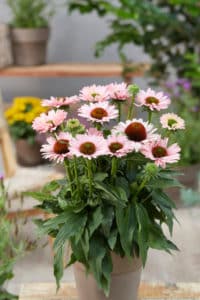BLOG: Grower report Van Woudenberg
Perennials remain popular with many garden enthusiasts. We visited garden plant nursery Van Woudenberg. Their perennials, known for their polar bear labels, are common in many garden centres. We were greeted by Liesbeth van Woudenberg and her brothers Gerbert and Rick.
How did the Van Woudenberg nursery start life?
Our parents had an orchard. By the time my brother Rick wanted to become a partner in the company, considerable investments were needed to stay competitive in fruit cultivation. Rick had finished his horticultural education, and thought that growing garden plants offered a better future. To learn the trade, we started off with contract crops for tree nurseries in the area. This way, we gradually converted parts of the fruit orchard into areas to grow garden plants. When we started growing perennial plants for a grower, we realised that it was exactly what we wanted to do. The original company is 50 years old, and we’ve now been growing garden plants for 20 years. We have expanded considerably over the years, and are still growing.
What makes your products special?
The resilience of perennials depends on their roots and the age of the plants. We get excellent starting material to grow with, but we first plant it in the soil instead of directly growing it in pots. From April to January, the plants have to withstand the Dutch spring, summer and winter, which is the basis for resilient, healthy plants. In January, the plants are harvested and we start putting them in pots. One part is then planted on our fields in Portugal, another part on our fields in the Netherlands. The third part is placed in our cold greenhouses in the Netherlands.
Why do you divide them up in this way?
We want to be able to supply visually attractive perennials to garden centres from the very early spring to late summer. The plants from Portugal are ready for sale first, then the plants from our greenhouse, and we end our season with the plants from our fields in the Netherlands. We’ve tested this method extensively, and we’re very pleased with the results.
Many of your products are known for attracting bees and butterflies. What’s the situation with harmful insecticides?
It looks absolutely stunning when the plants start to bloom on the fields. There are butterflies everywhere, and you can hear the constant humming of all the bees. We’re very aware of our responsibility to care for the planet, so we put our money where our mouth is, and certify our products according to ‘MPS Product Proof’ and MPS A.

Improved varieties that bloom a bit longer or are more resilient often appear. We’re happy to deal with these, but obviously we wouldn’t market them as ‘novelties’. A novelty has to be truly innovative, and these are rare.
We have won several prizes with the Anemone ‘Wild Swan’, a fantastic plant. We’ll also be launching 2 special novelties this year, the Lavandula Lamorosia® and the Echinacea Sunseeker® Salmon.
What does it mean to you to have Javado as a customer?
When you think of perennials, you think of garden centres. We consider Javado to be a proper garden centre supplier, with customers in different countries, so Javado is an important purchaser of our products. In addition, we enjoy the positive chemistry between us.
What are your plans for the future?
Our main focus is on providing garden centres with what they expect. If the weather suddenly turns nice, everyone expects to be able to order extra plants, and we want to be able to respond to this. However, we need space to spread out, and space to work properly, so we’re constantly expanding.
Published on: 14 May 2019